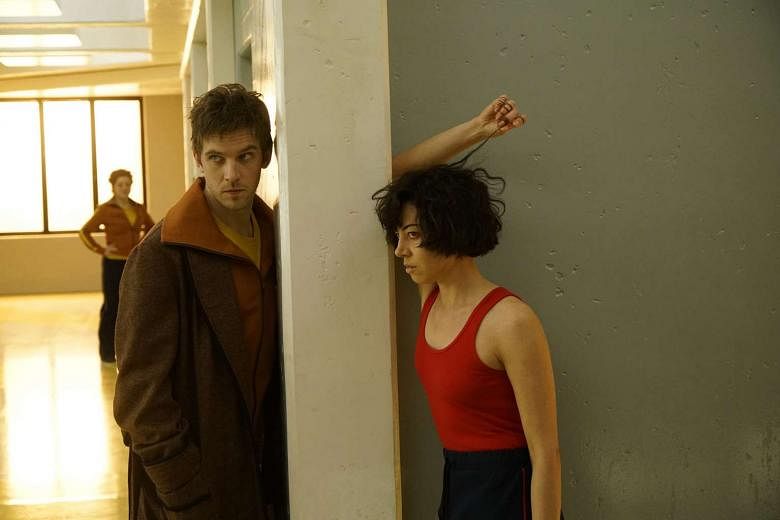In the pilot of American cable channel FX's Legion, we meet David (Dan Stevens), a powerful telekinetic (so we're told) suffering from mental illness (so he's been told) who is rescued from a psychiatric hospital (so it appears). Unsure whether to trust his perceptions, he asks his saviour and new girlfriend, Syd (Rachel Keller): "I have to know, is this real?"
If you've kept up with this hallucinatory Marvel Comics drama, whose first season finale airs on Wednesday, you know the answer: Yes. No. Maybe! And, anyway (inhales deeply from frog-shaped vaporiser), what is "real"?
Legion has left viewers as full of existential doubt as David, and with good reason.
Many of his thoughts and memories - his best friend, Lenny (Aubrey Plaza), even his childhood dog - have turned out to be figments generated by the Shadow King, a mental parasite living rent-free in David's noggin.
Scenes take place within illusions or illusions nested within illusions. David visits the scientist Oliver Bird (Jemaine Clement) in the astral plane, where Oliver lives in a spaceage bachelor pad inside an ice cube, which he generated by thought. "What's real in this space," Oliver says, "is whatever you want it to be."
Legion is merely the latest example of recent series, from Westworld to Mr. Robot, whose stories rely on apparitions and shaky perceptions - surreality TV, an art form for the days of fake news, gaslighting and contested objectivity.
TV history is full of fantasy sequences and realities that turned out to be fake. A season of Dallas proved to be a dream (as did the entire run of Newhart). St. Elsewhere, its finale suggested, was the imagining of an autistic boy. Lost spent half its final season in an alternative "sideways" universe.
These past switcheroos have generally involved finale twists or narrative do-overs. The current breed owes more to the head games of The Matrix (1999) and Inception (2010), which suggest that everything we see might be Plato's-cave shadow-puppetry.
"Have you ever questioned the nature of your reality?" a human interrogator asks Dolores (Evan Rachel Wood), a sentient robot, at the beginning of HBO's Westworld. She should question, we know, because while the show's robot "hosts" can think, their perceptions are limited by their programming.
They're wired to ignore anything that reminds them they are artificial. The "narratives" of their lives are literally scripted by authors. Their memories are erasable, but the ones they retain are as vivid as physical events, to them and to the audience.
This kind of playing with reality lends itself to science fiction and fantasy, like the alternative-history series The Man In The High Castle, set in an America that lost World War II. In it, a Japanese minister enters a trance and visits a timeline in which the United States is victorious and free - that is, our history. Is he fictional, or are we?
But mind games have pervaded many genres. In the thriller Mr. Robot, characters and whole story lines have proved to be inventions of the protagonist's subconscious. The dark romance The Affair is told from multiple, unreliable perspectives. The spiritual mystery The OA ended its first season suggesting that much of what we'd seen might not have happened.
This kind of "... or is it?" gamesmanship can be a cop-out - a cheap means of surprise that turns story into jigsaw puzzle. But there is something undoubtedly timely about stories in which there's no stable baseline of agreed-on reality.
Much like dada and surrealist art developed in reaction to the horrors of the 20th century, today's surreality TV is suited to a moment when shared objective truth is under attack.
These shows arrive at a time of fake news and the labelling of unwanted news as fake. Tech moguls entertain the notion that our world is a computer simulation. The White House press secretary cheerfully announces that formerly "phony" job numbers are real, now that they're positive.
In the global media ecosystem, the threat to information is not censorship so much as an overwhelming flood of inputs - hoaxes, trolls, bots, clickbait, conspiracy theories. When everything is in doubt, anything can be true.
The same modern audience that watches Legion receives its information through filters and algorithms, so that people in different social bubbles see the same news yet take away entirely different stories. One man's pizzeria is another man's paedophilia den.
So all this illusion, subjectivity, layers of virtual filters between us and a reality we may never see clearly - it's fiction, but it rings oddly familiar.
In the most recent episode of Legion, Syd dons a pair of spectacles that allow her to see through a mental projection created by the show's villain (a nod to John Carpenter's 1988 horror movie They Live). Glasses off, you see horrifying illusions. Glasses on, reality - or at least a truer phantasm.
There may not be a better metaphor for the way our own mediating devices - electronic, social, political - come between what happens in the physical world and the perceptions our brains relay. Is this real? The answer depends on the lenses.
NYTIMES

